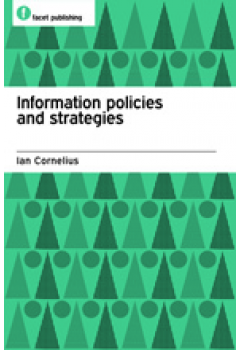
Primary tabs
You don't need to be an ALA Member to purchase from the ALA Store, but you'll be asked to create an online account/profile during the checkout to proceed. This Web Account is for both Members and non-Members.
If you are Tax-Exempt, please verify that your account is currently set up as exempt before placing your order, as our new fulfillment center will need current documentation. Learn how to verify here.
- Description
- Table of Contents
- Reviews
Librarians play a critical role in the establishment of larger-scale information policies and strategies. This essential new book will help practicing and aspiring librarians, researchers, and policy makers translate theory into practice and form sound policy decisions in the context of a broader public debate.
Chapters cover:
• an introduction to information policy and strategies
• problems in information policy
• policy sectors
• information regimes
• policy and strategy models and real life examples
Readers will gain a thorough understanding of the decision making process, the issues that most frequently cause new information policies to emerge, and the complex relationships between information policy and government, communication, education, technology, and public policy. Cornelius provides highly practical guidelines for developing policies for pertinent topics in the information profession, including censorship, data protection, intellectual property, and freedom of information. And he integrates real life models of global, influential information regimes with tools, tips, and suggestions for developing national, organizational, and library-centric policies.
1. Introduction
- How governments control information policies
- Other bodies that generate and control information
- Information policy as about any means by which the generation, distribution, and use of information is regulated
- What non-governmental agencies do within the realm of information policy
- Information policy must provide for different sorts of needs
- Information policy, public policy and other disciplines
- Conclusion
PART 1: CONTEXTS FOR INFORMATION POLICY
- Understanding the international contexts
- Globalization and technology
2. Globalization and information societies
- Information societies and information policy
- The information society: alternative views
3. Information policy and the public sphere
- The idea of a public sphere
- The structure of the public sphere
- The character of the public sphere
- Epilogue to Chapter 3
4. Information rights and information policy
- The rights of government
- The interests of business
- Common good
- Ann Wells Branscomb's information rights
- Internationally recognized rights
PART 2: INFORMATION POLICY SECTORS 5. Censorship, freedom of speech and freedom of expression
- Powers of intervention
- Other forms of censorship
- The history of censoring
- Making arguments for free speech
6. Arguments for protecting speech
- Cohen's analysis of freedom of speech
- Implications of Cohen's strategy
- Structural strengths
7. Privacy and data protection
- The need for legislation
- Confidentiality
- Problems of power
- General questions
- Putting principles into effect
8. Freedom of information
- Confronting governments
- Building commitment
- Constructing the case
- Questions of model building
- Competing principles and pressures
9. Intellectual property
- The market reward system
- Recognized types of intellectual property
- Policy analysis questions
- Rules and practices
- Copies and originals
- Policy responses
PART 3: CONCLUSION 10. Final considerations
- Information policies in non-democratic societies
- Non-state information policy
- Obligations
- Policy formation
- Outcomes: desires, intentions and objectives
- Do we really need information policies?
References and reading list
"I would recommend the book to most of the academic libraries as long as they have any programme in political, social science or humanities."
— Information Research


